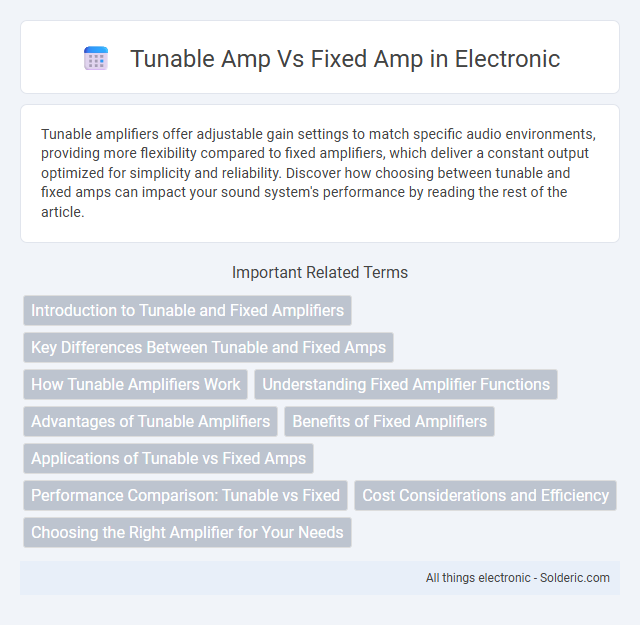Tunable amplifiers offer adjustable gain settings to match specific audio environments, providing more flexibility compared to fixed amplifiers, which deliver a constant output optimized for simplicity and reliability. Discover how choosing between tunable and fixed amps can impact your sound system's performance by reading the rest of the article.
Comparison Table
| Feature | Tunable Amplifier | Fixed Amplifier |
|---|---|---|
| Gain Control | Adjustable gain to customize amplification levels | Preset gain, no adjustment available |
| Flexibility | High flexibility for varying input signal strengths | Limited flexibility, fixed operation |
| Use Case | Ideal for dynamic environments requiring adaptable gain | Suited for stable environments with consistent signals |
| Complexity | More complex design, possibly higher cost | Simpler design, generally lower cost |
| Power Consumption | Typically higher due to adjustable components | Generally more energy efficient |
| Precision | Allows precise tuning for optimal signal quality | Fixed precision, may not suit all scenarios |
Introduction to Tunable and Fixed Amplifiers
Tunable amplifiers offer adjustable gain settings, allowing precise control over signal amplification for varying input levels. Fixed amplifiers provide a constant gain, ensuring stable and predictable amplification ideal for applications with consistent signal requirements. Your choice between tunable and fixed amplifiers depends on whether flexibility or simplicity in signal processing is prioritized.
Key Differences Between Tunable and Fixed Amps
Tunable amplifiers offer adjustable gain settings allowing precise control over signal strength, whereas fixed amplifiers provide a constant gain level designed for specific amplification needs. Tunable amps enable dynamic optimization in varying acoustic environments, making them ideal for applications requiring flexibility and fine-tuning. Fixed amps, by contrast, deliver stable, consistent performance with simpler design and typically lower cost, suited for scenarios where amplification parameters remain unchanged.
How Tunable Amplifiers Work
Tunable amplifiers operate by dynamically adjusting their gain through variable components such as varactors or digitally controlled resistors, enabling precise control of amplification levels based on input signal conditions. This adaptability allows them to optimize performance across varying frequencies and power requirements, improving signal integrity and reducing distortion compared to fixed amplifiers with constant gain. Their design involves feedback loops and control circuits that continuously monitor output and adjust parameters to maintain desired amplification characteristics in real-time.
Understanding Fixed Amplifier Functions
Fixed amplifiers provide consistent gain levels, ensuring stable signal amplification without the need for adjustment. These amplifiers are ideal for applications where a predictable and unchanging output is critical, such as in certain audio or radio frequency circuits. Understanding fixed amplifier functions helps you select components that deliver reliable performance and simplify circuit design by eliminating the complexity of gain tuning.
Advantages of Tunable Amplifiers
Tunable amplifiers offer enhanced versatility by allowing real-time adjustment of gain, optimizing performance across various frequencies and signal conditions. They enable precise control over amplification, reducing distortion and improving signal-to-noise ratio compared to fixed amplifiers. This adaptability makes tunable amplifiers ideal for dynamic applications such as wireless communications and adaptive sensing systems.
Benefits of Fixed Amplifiers
Fixed amplifiers provide stable and predictable gain, ensuring consistent signal amplification essential for applications requiring minimal signal distortion and high reliability. Their simpler design translates to lower cost, reduced complexity, and improved durability, making them ideal for mass production and fixed-frequency systems. These amplifiers exhibit better noise performance and linearity compared to tunable amplifiers, enhancing overall signal integrity in communication and audio devices.
Applications of Tunable vs Fixed Amps
Tunable amplifiers are ideal for applications requiring adaptive gain control, such as wireless communication systems, RF transceivers, and adaptive filters where signal conditions vary. Fixed amplifiers are best suited for applications with stable, predictable input signals like audio amplification, instrumentation, and fixed-gain sensor interfaces. The tunability feature in amplifiers enhances flexibility and performance in dynamic environments, whereas fixed amplifiers provide simplicity and consistency in controlled settings.
Performance Comparison: Tunable vs Fixed
Tunable amplifiers offer adjustable gain settings, enabling optimized performance across varying signal conditions, whereas fixed amplifiers provide a constant gain level tailored for specific applications. The flexibility in tunable amps allows improved linearity, noise figure, and power efficiency under dynamic operational environments compared to fixed amplifiers. Fixed amplifiers maintain consistent performance without complexity but lack adaptability, which can limit effectiveness in systems requiring variable amplification.
Cost Considerations and Efficiency
Tunable amplifiers offer higher efficiency by allowing power adjustment based on signal requirements, resulting in energy savings compared to fixed amplifiers that operate at constant power levels. Fixed amplifiers generally have lower initial costs due to simpler design and fewer components but may incur higher operational expenses due to wasted energy. Cost considerations must weigh upfront investment against long-term efficiency gains, especially for applications with variable signal demands.
Choosing the Right Amplifier for Your Needs
Tunable amplifiers offer precise control over gain settings, allowing you to customize signal amplification for varying input levels and environments, making them ideal for applications requiring flexibility and fine-tuning. Fixed amplifiers provide consistent gain levels, ensuring simplicity and reliability in setups where signal characteristics remain stable and do not require adjustment. Understanding your system's requirements for adaptability versus simplicity will help you choose the correct amplifier that optimizes performance and meets your specific needs.
Tunable amp vs Fixed amp Infographic

 solderic.com
solderic.com